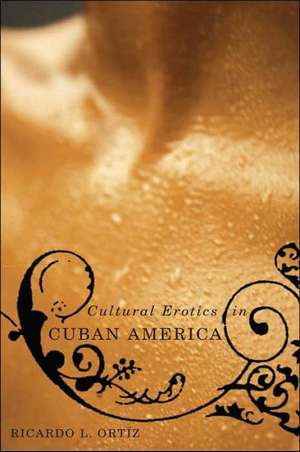Cultural Erotics in Cuban America
Autor Ricardo L. Ortízen Limba Engleză Paperback – 3 ian 2007
Miami is widely considered the center of Cuban-American culture. However vital to the diasporic communities’ identity, Miami is not the only—or necessarily the most profound—site of cultural production. Looking beyond South Florida, Ricardo L. Ortíz addresses the question of Cuban-American diaspora and cultural identity by exploring the histories and self-sustaining practices of smaller communities in such U.S. cities as Los Angeles, Chicago, and New York.
In this wide-ranging work Ortíz argues for the authentically diasporic quality of postrevolutionary, off-island Cuban experience. Highlighting various forms of cultural expression, Cultural Erotics in Cuban America traces underrepresented communities’ responses to the threat of cultural disappearance in an overwhelming and hegemonic U.S. culture. Ortíz shows how the work of Cuban-American writers and artists challenges the heteronormativity of both home and host culture. Focusing on artists who have had an ambivalent, indirect, or nonexistent connection to Miami, he presents close readings of such novelists as Reinaldo Arenas, Roberto G. Fernández, Achy Obejas, and Cristina García, the playwright Eduardo Machado, the poet Rafael Campo, and musical performers Albita Rodríguez and Celia Cruz.
Ortíz charts the legacies of sexism and homophobia in patriarchal Cuban culture, as well as their influence on Cuban-revolutionary and Cuban-exile ideologies. Moving beyond the outdated cultural terms of the Cold War, he looks forward to envision queer futures for Cuban-American culture free from the ties to restrictive—indeed, oppressive—constructions of nation, place, language, and desire.
Ricardo L. Ortíz is associate professor of English at Georgetown University.
In this wide-ranging work Ortíz argues for the authentically diasporic quality of postrevolutionary, off-island Cuban experience. Highlighting various forms of cultural expression, Cultural Erotics in Cuban America traces underrepresented communities’ responses to the threat of cultural disappearance in an overwhelming and hegemonic U.S. culture. Ortíz shows how the work of Cuban-American writers and artists challenges the heteronormativity of both home and host culture. Focusing on artists who have had an ambivalent, indirect, or nonexistent connection to Miami, he presents close readings of such novelists as Reinaldo Arenas, Roberto G. Fernández, Achy Obejas, and Cristina García, the playwright Eduardo Machado, the poet Rafael Campo, and musical performers Albita Rodríguez and Celia Cruz.
Ortíz charts the legacies of sexism and homophobia in patriarchal Cuban culture, as well as their influence on Cuban-revolutionary and Cuban-exile ideologies. Moving beyond the outdated cultural terms of the Cold War, he looks forward to envision queer futures for Cuban-American culture free from the ties to restrictive—indeed, oppressive—constructions of nation, place, language, and desire.
Ricardo L. Ortíz is associate professor of English at Georgetown University.
Preț: 228.99 lei
Nou
Puncte Express: 343
Preț estimativ în valută:
43.86€ • 45.18$ • 36.74£
43.86€ • 45.18$ • 36.74£
Carte tipărită la comandă
Livrare economică 24 februarie-10 martie
Preluare comenzi: 021 569.72.76
Specificații
ISBN-13: 9780816647965
ISBN-10: 0816647968
Pagini: 328
Dimensiuni: 150 x 229 x 23 mm
Greutate: 0.48 kg
Ediția:First edition
Editura: University of Minnesota Press
Colecția Univ Of Minnesota Press
ISBN-10: 0816647968
Pagini: 328
Dimensiuni: 150 x 229 x 23 mm
Greutate: 0.48 kg
Ediția:First edition
Editura: University of Minnesota Press
Colecția Univ Of Minnesota Press
